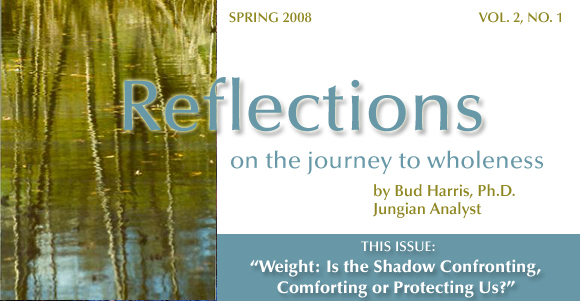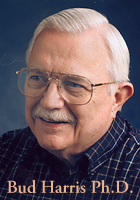Since I listed “weight” as a future topic, many of you have asked me to go ahead and share some of my reflections about it. When I was eight years old, my family was caught in a time of severe frustration, change and insecurity. That was when I began to cover myself with a layer of protection and assuage my anxiety with eating. That is when my odyssey with weight began. Decades later, while struggling for new awareness in mid-life, I learned my weight is a messenger about how I am living. I can deny it, ignore it or fight it and it will continue to gain substance. If my denial is strong enough, my weight responds by increasing, by beginning to tire me out, shorten my breath and break me down.
Through years of reflection I have become aware of how at different times my weight has secretly protected me, has been a challenging adversary, a companion and even a spiritual guide arising from a deep inner longing I had difficulty facing.
Our cultural obsession with being thin has become a source of shame and deep concern for many of us. Thousands of diet books and weight-loss programs have evolved during my lifetime. Yet, very few of them search for the meaning of our hunger or the symbolic substance that weight provides. Even depth psychology has shied away from this subject. I realized something wasn’t right in my first analysis when I became aware I had gained forty pounds and my analyst hadn’t noticed or mentioned that it might have a symbolic meaning. Whatever your experience is I hope you will find these reflections challenging, provocative and useful— and that you will share some of your thoughts and responses with us.
Weight, our fat, defies the gods of the modern world: rationality, will-power, technology and individualism. Without realizing it we keep these should-be-dying gods alive in the unconscious ways we face our lives. Individualism, for example, thrives in the entrenched idea that we should be in control, face our problems, fix them ourselves or resolve them with quick expert help and then move on with our lives. The tools of these gods, diet fads, exercise machines, determination, surgery, medications and temporary victories fail us when confronted by the deeper unmet needs behind our weight. Not only do these old gods fail us, the stubborn way we cling to them-cling to our lack of true awareness-is forcing our weight onto our children.
In the lives of primitive people hunger was a stronger force for self-preservation than sex. Jung said, “At this level hunger is the alpha and omega-existence itself.” Our primitive psyche has filled our language with metaphors about eating and hunger. Hunger caused ancient people to make food into gods to be eaten and drunk. Osiris was the wheat; ancient Pharohs were worshipped as eaters of the gods. Even today the Host is presented in wafer form to be ritually eaten. And, we may like or love someone enough to “eat them up.”
During the middle ages the art of the great masters showed weight as a sign of beauty, prosperity and safety. But, during my lifetime these values have reversed themselves and weight has become a symbol of shame, of failure to meet our collective ideals of self-control and what it means to be a healthy person.
Both our language and our religious history are filled with metaphors which express one instinct or one need in terms of another. In trying to understand our weight, our psychological search is for what vital need, what relentless longing has decided to express itself through the symbolism of our weight and hunger.
When I began my analysis over again with a new analyst, we confronted my weight gain. The first illusion to fall was my hope that I could change my life without having to seriously confront it and the people close to me. Like most of us I wanted peace of mind, good relationships and a fulfilling life while keeping my old habits and the lifestyle I had worked to achieve. My weight was insisting that transformation isn’t that easy.
I thought analysis and my inner work was going to lead to a great life. Instead it led through healing and into new challenges. Jung said in a letter dated June 20, 1932 that “— our proper life task must necessarily appear impossible to us for only then can we be certain that all of our latent powers will be brought into play.” I found that when I didn’t face my proper task at the moment I ended up facing an impossible weight problem.
Physical hunger needs a meal and spiritual hunger needs a numinous content. In this vein we need to imagine what need our hunger is symbolizing. Is our hunger for sweetness really for love and tenderness, for quiet, or for the not completely fulfilled soft embrace of a loving parent? Is our hunger for carbohydrates actually for the substance of matter, for grounding or is the hunger for salty things really the need for a more flavorful life. In other words, we need to create a space for our hunger to be reflected upon in the field of our imagination where we can bring its true meaning out of our shadow, the unconscious closet we’ve locked it in, and into our awareness.
In the container of my analysis and my journal I needed to create a sacred space where I could dare to:
- Ask the questions that I dreaded the most.
- Give voice to my most secret desires.
- Express the hurt and rage I had hidden for decades, even from myself.
- Articulate my dreams of love in their fullest sense.
- Put into words my hopes for an impossible future.
And I had to learn to let my imagination, the voice of the unconscious, come to my aid through active imagination and dreams, to let the Self, the Divine within, become known and experienced in both anguish and joy. I also had to learn to say no to the sanctified voices of rationality and common sense, to quiet the scornful words of my inner cynic and to accept the reality of my own wounds and needs to heal and grow with compassion and strength.
Jung emphasizes again and again that nothing can be transformed until it is accepted. Acceptance means feeling the power of our longings, the depths of our needs, pain and fear. It was terribly hard for me to even think about accepting my weight. I wanted to conquer it. But, in this effort I learned that if I make a part of myself an enemy and try to fight or deny it, it takes on the guise of its own identity and develops its own arsenal of weapons and defenses. Then the more I attack it or ignore it the more I get entangled in hatred and bitterness with myself.
The important point is that our hunger and our weight are challenging us to awaken to our need for bigger questions than whether we are doing things right or wrong. When we have eating or weight problems it takes strength and awareness to shift out of our old mindsets of shame, weakness, anger or whatever to see that something we think is wrong is trying to get us to transform in ways that will help our lives be better on a more profound level. Jung calls this actuality the teleological aspects of symptoms. He also notes that we need to be humble enough to accept the guidance offered by our unconscious coming through our symptoms.
Making these points reminds me of Trudi, a professional woman, married with children and in her early forties. Trudi is willing to share this part of her journey in hope that it may help us all.
No matter what issue we worked on, she always came back to how distressed she was about being 35 lbs. over her normal weight. Of course she has tried Weight-Watchers(TM), many diets, cognitive therapy and exercise. Repeated failures only made her feel worse about herself.
Finally, I suggested that she dialogue with her weight. She tried and nothing happened. Then I suggested that she dialogue with “Fat Trudi”. “Oh, shit,” she said, “that might work.”
Finally, I suggested that she dialogue with her weight. She tried and nothing happened. Then I suggested that she dialogue with “Fat Trudi”. “Oh, shit,” she said, “that might work.”
Trudi began her dialogue writing “Fat Trudi, I hate you, I despise you! You make me look bad! You make me feel bad! You embarrass me! I am ashamed for even my husband to see me. You destroy my self-esteem!”
Fat Trudi replied, “Stop right there! I’ve had enough of this finger pointing, nagging and hatred. Do you think I’m in here because I want to be? I’m in here because you created me-you used me. I know how you hate me. You show so much compassion to your kids and others, but none for me. Where is that Divine love you’re always going on about?”
Trudi is stunned, taken aback, and writes, “How can I help? I realize how destructive hate is. You are the pain and darkness in my life. You must be carrying my cross.”
Fat Trudi: “I have never felt love. Acknowledge me. I crave the sweet life; I want to be happy, to get attention and appreciation. You have to learn how to be passionate about your-or rather, our-life.”
Trudi: “I don’t know— I don’t know how to love myself. Can you teach me?”
Fat Trudi: “I don’t know. You always think you’re right. Talk to me until we trust each other and I will try. Only a bigger love can turn hatred into love.”
This spontaneous dialog is only the beginning of a long inner journey. But it can help us see how acceptance and “relating to” can be turning points and how weight can become a teacher. To receive our weight is to receive otherness, part of our shadow manifested in flesh and blood, to relate to it, to learn from it and thereby expand our souls.
Early in life my weight became the fortress I retreated into when faced with risk, pain, struggle and conflict. And, it was a cry for love, for living a life that had its proper share of nurturance and sweetness. I gained weight until I realized my life wasn’t being satisfied by real experience. My hunger for life and love were being accumulated in my shadow and driven into my body.
My relationship to my weight is more important than whether I’m slim. Weight is the field of imagination where my reflections about the nature of myself and life often come together and I get some insight into the pattern the Self has for me to fulfill. Our collective weight problem reflects our stubbornness about letting old gods die and allowing ourselves to become open to the love we have been afraid of. Perhaps it is also the soul’s way of getting our attention, of wanting us to value love as the ground of our being which means to heed Rilke’s advice to the young poet when he said, “Perhaps all of the dragons of our lives are princesses who are only waiting to see us once, beautiful and brave. Perhaps everything terrible is in its deepest being something that needs our love.”
2. “Body and Soul: Illness and the Healing Power of the Shadow”
3. “Living a Mythic Life: What is Your Myth or What Myth is Living You?”
4. “The Fear of the Feminine: How it Affects Our Lives and Relationships?”
Articles by Drs. Bud and Massimilla Harris


Comments are closed.